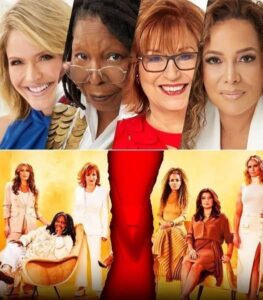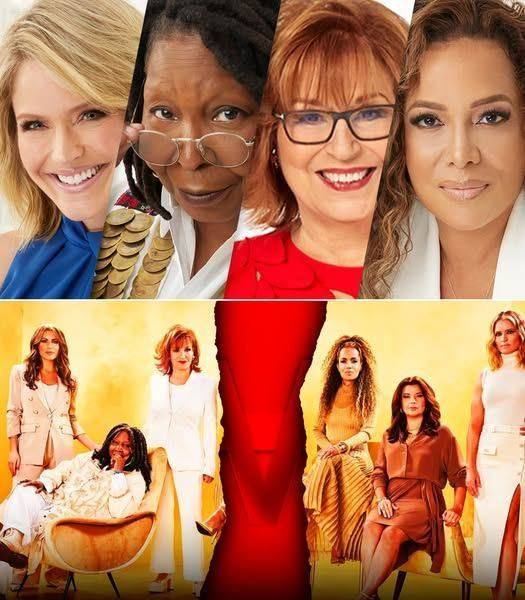In a surprising development that has shocked the entertainment industry, ABC has formally declared the termination of the cherished daytime talk show The View, which has been on the air for over 25 years.
The program, a longstanding fixture of daytime television, is set to broadcast its final episode later this year, signifying the conclusion of a significant chapter in American television history.
This announcement has caused considerable surprise among fans, industry experts, and critics, who are left questioning the reasons behind this sudden choice and its implications for the future of daytime talk shows.
Since its launch in 1997, The View has established itself as one of the most enduring talk shows on air.
Renowned for its varied panel of female hosts who engage in discussions about current events, politics, and social issues, the show has served as a vital platform for meaningful dialogue while also igniting passionate debates among its participants.
The View Achieves Its Highest Ratings in a Decade Following the Post-Election Episode
Throughout its history, The View has showcased a diverse range of panelists, including the candid Star Jones and Rosie O’Donnell, as well as more contemporary outspoken personalities such as Meghan McCain and Joy Behar.
Its distinctive format has established The View as a prominent platform that merges entertainment, political discourse, and personal narratives, successfully drawing in millions of viewers daily.
Nevertheless, the announcement of its cancellation surprised many who had become accustomed to The View’s significant cultural impact and its capacity to resonate with the sentiments of the nation.
In an official statement, ABC remarked, ‘After thorough deliberation, we have reached the challenging conclusion to conclude The View.’

Although The View enjoyed a loyal audience for many years, its programming—characterized by debates and discussions on politics, controversies, and personal drama—might have begun to feel monotonous to some viewers.
The ongoing exchanges among the hosts, while at times captivating, may have become tiresome for those desiring a more lighthearted or less contentious viewing experience.
Furthermore, in light of the persistent political polarization in the United States, many viewers may have become fatigued by the intense political discourse that has become a focal point of the show.
While the show’s political coverage distinguished it during election periods, it also alienated some viewers who preferred a more neutral or balanced perspective on current events.
In recent years, daytime talk shows have been evolving to appeal to a wider audience. Programs such as The Kelly Clarkson Show and The Drew Barrymore Show have adopted a more relaxed and entertaining format, emphasizing celebrity interviews, human interest stories, and uplifting moments.
These shows have achieved impressive ratings, and their success has contributed to a shift in audience preferences—one that The View may have found challenging to adapt to.
Whoopi Goldberg, Joy Behar, and Sunny Hostin have been integral members of the show for many years, and their exits will certainly create a significant gap in the realm of daytime television.
Goldberg, in particular, has represented the show since its beginning, and her departure signifies the conclusion of a significant chapter.
The future paths for the hosts remain uncertain; Goldberg, a talented actress and comedian, may pursue opportunities in film and television, while Behar and Hostin might seek new ventures in various media.
There is even speculation that some of the panelists could transition to other networks or initiate their own independent projects, potentially through new talk shows or digital platforms.
Although the hosts’ futures are unclear, it is evident that The View has profoundly influenced the daytime talk show landscape, leaving a legacy that will resonate in television for years to come.
As the news of The View’s cancellation is absorbed, numerous fans and critics are contemplating the enduring influence the show has had on American culture.
During its broadcast, The View transcended the typical talk show format; it served as a forum for genuine, candid discussions, addressing sensitive subjects and amplifying a variety of perspectives.
The program highlighted matters frequently overlooked by mainstream media, including women’s rights, racial justice, LGBTQ+ advocacy, and mental health awareness.
It became a significant cultural reference point, with its impact reaching well beyond television.
Although the show is concluding, The View’s legacy will endure through the numerous individuals it influenced and the dialogues it initiated.
The series opened doors for women in the television industry and illustrated the importance of diverse voices in shaping societal conversations.
In conclusion, the discontinuation of The View serves as a reminder of the ever-changing landscape of television and media.
While it signifies the conclusion of one of the most legendary talk shows, it simultaneously creates opportunities for new voices and formats to arise.
The lingering question is: What will take The View’s place in the hearts and minds of daytime television audiences?
The cancellation of The View may signify the conclusion of a significant period, yet discussions regarding the future of television are only commencing.


